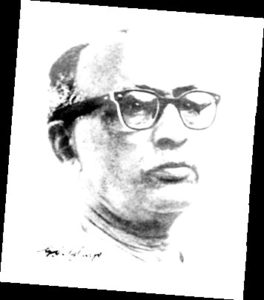S. Ghurye or Govind Sadashiv Ghurye was born on 12 December 1893 in Malwan, a town in Maharashtra and was a professor of sociology.

He completed his schooling at Aryan Education Society’s High School, Gurgaon in Mumbai and then from Bahadur Khanji High School, Junagadh in Gujarat. He completed his Graduation and Masters in Sanskrit from Elphinstone College, Mumbai. He received the Bhau Daji prize and the Chancellor’s gold medal with his Bachelor’s and Masters degree respectively. Apart from this, he received a scholarship on the basis of which he moved to England and pursued his Ph.D. from Cambridge University in 1922. W.H. Rivers (William Halse Rivers Rivers) was an English anthropologist, neurologist, ethnologist, and psychiatrist and was revered for his contribution in the treatment of the First World War officers who suffered from shell shock. Ghurye was deeply influenced by William’s ideologies and was also his Ph.D. guide. However Rivers died in 1922, and then on Ghurye completed his thesis under A. C. Haddon who was also an anthropologist and ethnologist.
The Department of Sociology at Mumbai University had appointed Ghurye as the Head of the Department in 1924. He retired from them in 1959. It was Patrick Geddes who founded it and Ghurye had taken over when it was about to close. But from the time it came under his supervision, it revived again and thus he was regarded as it’s the founder. It was from then on that he “shaped” the study of sociology. He was the head and founder of the Indian Sociological Society and its newsletter; Sociological Bulletin. The Bombay Anthropological Society was also headed by him.
He wrote a number of papers, 32 books and conducted 80 research papers. Two theses were also written on him later. Many social reformers and intellectuals like A. R. Desai, De. Uttamrao K Jadhav, M. N. Srinivas, and others studied under him.
His works include Caste and race in India; The aborigines-“so-called” – and their future; Indian costume Bharatiya vesabhusa; Race relations in Negro Africa; Sexual Behaviour of the American Female and others. However, Caste and race in India is his most notable work.
According to him, caste was a derivative of race. He had strong beliefs towards caste. And these facts about the relation between race and caste resonated with the Sanskrit scriptures. He also made the use of the “Aryan” theory in his portrayal of opinions on caste. In this book of his, he tells how the Vedic religion and the Brahmanic variety entered in Indian along and because of the Indo- Aryans in 2500 B. C. And this, later on, resulted in the development of the caste system in India. He talks about racial interpretations. The idea of Varna and “dasas” introduced by the Aryans were very discriminative. Ghurye also concluded that “Brahmanic practice of endogamy must have been developed in Hindustan and thence conveyed as a cultural trait to the other areas without a large influx of the physical type of the Hindustan Brahmins” (Caste and race in India.1969: 125).
All said and done, there’s no doubt that Ghurye made his intellectual impression as an incisive social thinker who was equally at ease with the Vedic and contemporary India’s practices. Ghurye’s contribution in the flourishing of sociology and other interconnected sciences was enormously multi-faceted. A most notable fact is that Ghurye not only contributed to Indian Sociology Literature but also of foreign. Thus he played a key role in the professionalization of Sociology.
Literature Student at Delhi University!
